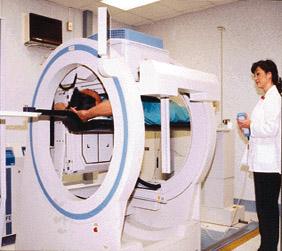
May 18, 2011 – Lantheus Medical Imaging Inc. announced data from a phase 2 clinical trial that demonstrated positron emission tomography (PET) myocardial perfusion imaging with flurpiridaz F18 provided superior image quality, diagnostic certainty and diagnostic performance for detecting coronary artery disease (CAD) compared to single photon emission computed tomography (SPECT) myocardial perfusion imaging (MPI), the current standard for the noninvasive detection of CAD. The data also demonstrated a positive safety profile for PET imaging with flurpiridaz F18. The data were featured today in a late-breaking presentation by Jamshid Maddahi, M.D., FACC, professor of molecular and medical pharmacology (nuclear medicine) and medicine (cardiology) at the David Geffen School of Medicine at UCLA, and lead principal investigator of the study, at ICNC10 - Nuclear Cardiology and Cardiac CT Conference in Amsterdam.
“Results from this phase 2 trial show that PET myocardial perfusion imaging with flurpiridaz F18 demonstrates a strong safety profile and is superior to SPECT imaging with respect to the quality of rest and stress images, certainty of image interpretation and diagnostic performance as measured by standard ROC analysis for detecting CAD,” said Maddahi. “Overall, this enhanced diagnostic performance may lead to more accurate testing and more appropriate patient management decisions in comparison to other noninvasive diagnostic modalities and, as such, we see great value in proceeding to phase 3 clinical trials.”
In the phase 2 trial, 143 patients from 21 centers underwent rest and stress PET and SPECT myocardial perfusion imaging and were evaluated for safety. Of these patients, 86 underwent coronary angiography and formed the population for evaluating diagnostic performance. PET myocardial perfusion imaging was performed with flurpiridaz F18 at rest and at stress utilizing pharmacological coronary vasodilation or treadmill exercise. It is important to note that flurpiridaz F18 can be used in conjunction with treadmill exercise, which is not feasible with the more commonly used alternative PET tracers for myocardial perfusion imaging.
Results showed that a significantly higher percentage of images were rated as either excellent or good quality with PET imaging, compared to SPECT imaging for stress images (98.8% vs. 84.9%, p
In March 2011, Lantheus received special protocol assessment approval from the U.S. Food and Drug Administration (FDA) for the phase 3 trial of flurpiridaz F18. The phase 3 clinical development program will include two open-label, multicenter trials to assess the diagnostic efficacy (both sensitivity and specificity) of flurpiridaz F18 PET MPI, compared with SPECT myocardial perfusion imaging in the detection of significant coronary artery disease. The trials will enroll a total of approximately 1,350 patients at approximately 100 sites globally. Coronary angiography will be the truth standard for all patients. The clinical development program includes hypotheses for superiority for sensitivity and non-inferiority for specificity with an adequate sample size to demonstrate superior specificity if present. An interim analysis will take place upon 50 percent enrollment of the first trial.
Flurpiridaz F18 injection, a fluorine 18-labeled agent that binds to mitochondrial complex 1 (MC-1), was designed to be a novel myocardial perfusion PET imaging agent for the diagnosis of CAD. PET imaging with flurpiridaz F18 has the potential to be a new clinical tool for the evaluation of myocardial perfusion that may better evaluate patients with known or suspected CAD in comparison to other noninvasive diagnostic modalities.
For more information: visit www.lantheus.com


 January 05, 2026
January 05, 2026 









